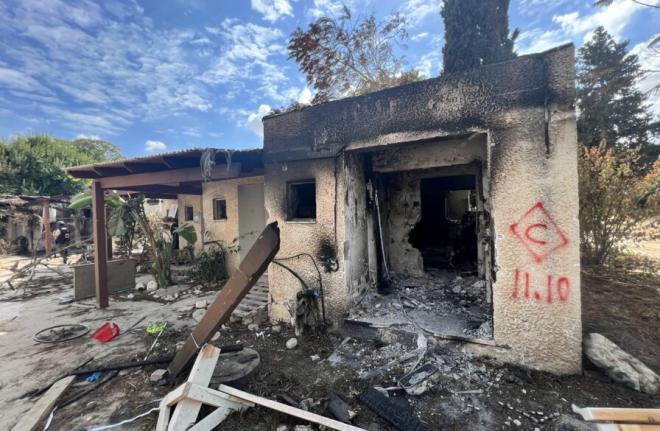六十天後,以色列的戰爭遠未結束Sixty Days In, Israel’s War Far From Over
Published by admin on Thu, 12/07/2023 - 14:04
Sixty Days In, Israel’s War Far From Over
Published on: 5.12.2023
By David Parsons, Vice President & Senior Spokesman
Two months ago, Israel was suddenly thrust into a terrible war when thousands of Hamas terrorists infiltrated from Gaza and carried out the worst single day of massacre and carnage against the Jewish people since the Holocaust. The staff of the International Christian Embassy Jerusalem immediately went into crisis response mode to help Israelis deal with their most daunting challenge in generations – and the crisis is far from over some sixty days later.
Israel has yet to recover from the shock of over 1,200 Israelis murdered by Hamas terrorists on October 7, as more victims of that horrific pogrom are still being identified and buried each week. Israelis also have endured the relentless barrages of over 10,000 rockets fired from Gaza into Israel over the past two months. Meanwhile, the long ordeal to return the more than 240 people taken hostage into Gaza continues, with some 100 abductees – mostly women and children – finally freed during a seven-day pause in fighting in Gaza.
The Israeli military responded to the Hamas onslaught with several weeks of air strikes on terror targets inside Gaza to prepare the way for a ground offensive that steadily encircled Gaza City in the northern end of the Strip. The IDF managed to coax some one million Gazan civilians to flee south to safer areas, and then began the slow, dangerous task of rooting out Hamas fighters hiding in a labyrinth of over 300 miles of underground tunnels.
The Israeli army’s steady progress in rolling back the Hamas threat eventually forced the radical Islamist terror militia to agree to a temporary truce and hostage release deal. That break lasted for a week until Hamas refused to release the last batch of women and children, and now the IDF is finishing off Hamas in northern Gaza and starting to roll its tanks into the stronghold of Khan Yunis in the south.
To some extent, the conflict has been largely contained to Gaza and the adjoining border area, with IDF troops operating inside the Strip and the Iron Dome anti-missile batteries protecting Israel’s civilian heartland from the persistent rocket volleys from Gaza. However, there are serious battles raging on several other fronts that have kept the nation in fear of a much larger war. This includes the rising Palestinian terror threat in Judea/Samaria (the ‘West Bank’) and the even greater threat of the radical Hizbullah militia in Lebanon.
To deal with all these multiple fronts, Israel took two major steps at the start of the conflict which have greatly helped the war effort but also severely impacted the nation’s economy. First, the IDF called up more than 300,000 reservists to supplement its standing army, creating the largest force Israel has ever fielded. But this also took countless men and women away from their jobs, crippling the business sector.
In addition, Israel evacuated most of the towns and villages along the Gaza border, as well as those along the northern border with Lebanon – to keep Hizbullah from carrying out similar cross-border massacres like Hamas did. But this has displaced some 250,000 Israeli civilians, who are now being temporarily housed in the center of the country. This has created an extra heavy burden on the government budget and national economy.
One of Israel’s war aims is to remove the threat which Hamas and Hizbullah pose to the southern and northern borders, so these displaced Israeli families can go back to their homes in peace. Yet current estimates say it may be months before they can safely return. And now some of these community leaders are telling us they will probably stay in their temporary housing until next fall, so the children can spend the entire school year in the same place.
All the while, Israelis are living with the threat that Hizbullah might escalate its artillery duels along the northern border into an all-out war. This would put the whole country under relentless barrages of much heavier, longer-range missiles, many of them guided, for many more months to come.
So, even though we know Israel will eventually prevail, they are still far from the end of this conflict. And the urgent needs here remain immense.
From the start, the ICEJ has been on the frontlines of this conflict on your behalf, comforting those who lost family and loved ones, delivering urgent relief aid to distraught evacuees, providing needed emergency and medical equipment to first responders, donating ambulances, ordering more bomb shelters, and so much more.
Nicole Yoder packs food items
Colombia
bell shelter being delivered
We also have been showing solidarity with Israel through our global network of national offices, especially in calling for the return of hostages taken into Gaza. Learn more at: http://icej.org/solidarity
And we have been earnestly praying, with fasting, for a swift and complete victory by Israel over this vicious Islamist terror militia, and for the freeing of Gazans from the death cult of Hamas. Find out more at: https://www.icej.org/pray-with-us
Please continue to support our urgent efforts to help Israel through this difficult time and on to a brighter future. Please give your best gift today towards our Israel in Crisis Fund. Donate at: https://give.icej.org/crisis
六十天後,以色列的戰爭遠未結束
發佈於:2023 年 12月5日
作者:副總裁兼資深發言人大衛森柏斯
兩個月前,以色列突然陷入了一場可怕的戰爭,數千名哈馬斯恐怖分子從加薩滲透,對猶太人民進行了自大屠殺以來最嚴重的屠殺和屠殺。耶路撒冷國際基督徒大使館的工作人員立即進入危機應對模式,幫助以色列人應對幾代以來最艱鉅的挑戰——而危機遠未超過六十天。
以色列尚未從10月7日1,200 多名以色列人被哈馬斯恐怖分子殺害的震驚中恢復過來,每週仍有更多這場可怕大屠殺的受害者被辨認和埋葬。過去兩個月裡,以色列人還遭受了從加薩向以色列發射的一萬多枚火箭的無情攻擊。與此同時,將240多名被扣為人質的人送回加薩的漫長磨難仍在繼續,大約100名被綁架者(其中大部分是婦女和兒童)最終在加薩戰鬥暫停7天期間獲釋。
以色列軍方對加薩境內的恐怖目標進行了數週的空襲,以回應哈馬斯的猛攻,為穩步包圍加薩地帶北端的加沙城的地面攻勢做好準備。以色列國防軍成功誘騙約 100 萬加薩平民向南逃往更安全的地區,然後開始了一項緩慢而危險的任務,即剷除隱藏在300多英里迷宮般的地下隧道中的哈馬斯戰士。
以色列軍隊在擊退哈馬斯威脅方面取得的穩步進展最終迫使激進的伊斯蘭恐怖民兵同意臨時休戰和釋放人質協議。 這種中斷持續了一周,直到哈馬斯拒絕釋放最後一批婦女和兒童,現在以色列國防軍正在消滅加薩北部的哈馬斯,並開始將坦克開進南部的汗尤尼斯據點。
在某種程度上,衝突主要局限於加薩和毗鄰的邊境地區,以色列國防軍部隊在加薩地帶內行動,鐵穹反導系統保護以色列平民中心地帶免受來自加薩的持續火箭彈襲擊。然而,其他幾條戰線上也發生了激烈的戰鬥,使該國擔心發生更大規模的戰爭。這包括猶太/撒馬利亞(「西岸」)不斷上升的巴勒斯坦恐怖威脅,以及黎巴嫩激進真主黨民兵的更大威脅。
為了回應所有這些多重戰線,以色列在衝突開始時採取了兩個重大步驟,這大大幫助了戰爭的努力,但也嚴重影響了國家的經濟。 首先,以色列國防軍徵召了超過30萬名預備役軍人來補充其常備軍,打造了以色列有史以來部署的最大規模的部隊。 但這也讓無數男人和女人失業,損害了商業部門。
此外,以色列也撤離了加薩邊界以及北部與黎巴嫩邊境的大部分城鎮和村莊,以防止真主黨像哈馬斯一樣進行類似的跨境屠殺。 但這已經導致約 25 萬以色列平民流離失所,他們目前被暫時安置在該國中部。 這給政府預算和國民經濟造成了格外沉重的負擔。
以色列的戰爭目標之一是消除哈馬斯和真主黨對南部和北部邊境的威脅,以便這些流離失所的以色列家庭能夠平安返回家園。 但目前的估計表明,他們可能需要幾個月的時間才能安全返回。 現在,其中一些社區領導人告訴我們,他們可能會一直住在臨時住房直到明年秋天,這樣孩子們就可以在同一個地方度過整個學年。
同時,以色列人一直面臨真主黨可能將北部邊境的砲火對決升級為全面戰爭的威脅。 這將使整個國家在未來幾個月內遭受更重、射程更遠的飛彈的無情攻擊,其中許多是導引飛彈。
因此,儘管我們知道以色列最終會獲勝,但他們距離這場衝突的結束還很遠。 這裡的迫切需求仍然龐大。
從一開始,ICEJ 就代表您站在這場衝突的最前線,安慰那些失去家人和親人的人,向心煩意亂的撤離者提供緊急救援援助,向急救人員提供所需的緊急情況和醫療設備,捐贈救護車,訂購更多防空洞等等。
妮可·約德 (Nicole Yoder) 包裝食品
我們也透過我們的全球國家辦事處網絡表達了對以色列的聲援,特別是呼籲歸還被劫持到加薩的人質。了解更多:http://icej.org/solidarity
我們一直在禁食中懇切祈禱,希望以色列能迅速徹底地戰勝這個邪惡的伊斯蘭恐怖民兵,以及將加薩人從哈馬斯的死亡崇拜中解放出來。了解更多:https://www.icej.org/pray-with-us
請繼續支持我們的緊急努力,幫助以色列度過這段困難時期,走向更光明的未來。 今天請向我們的以色列危機基金獻上您最好的禮物。 奉獻網址:https://give.icej.org/crisis
